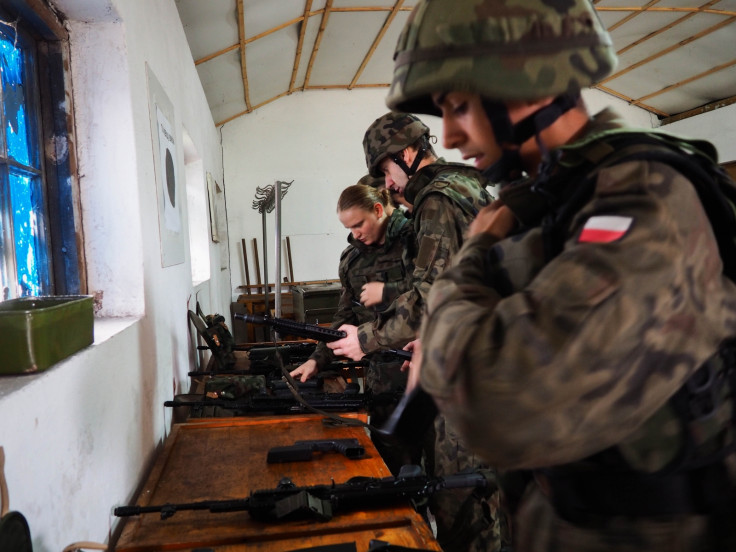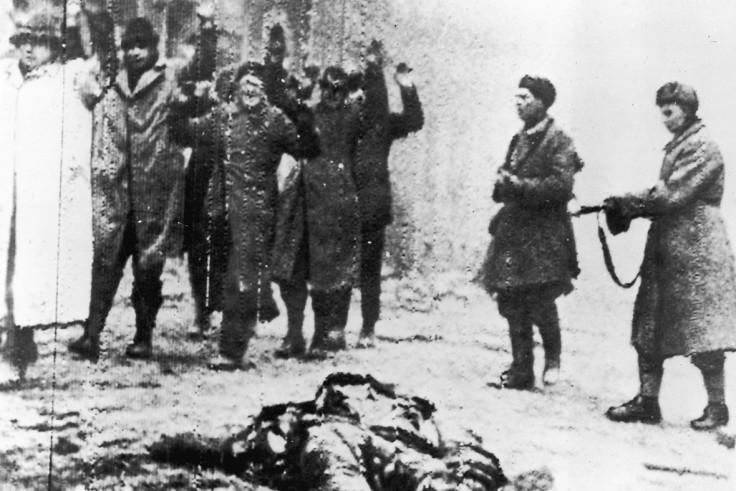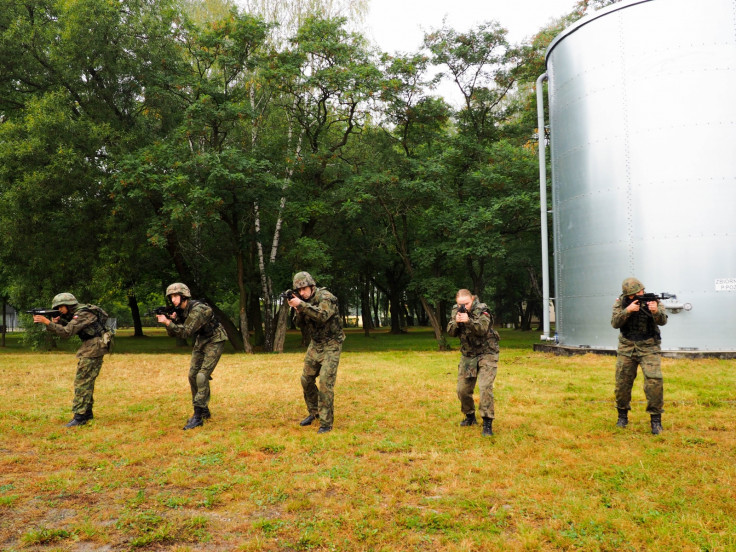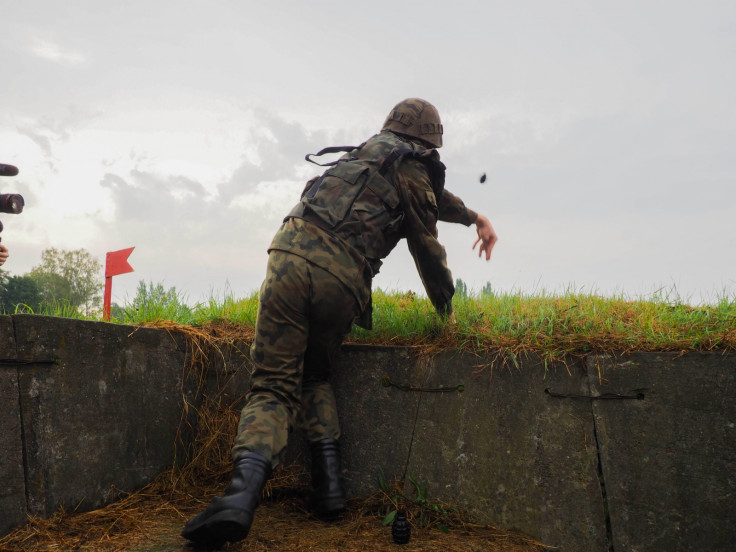'We must protect Poland from Putin' say militia fighters as fears grow of Donald Trump NATO retreat
The numbers of young Poles signing up to join 120 militias has tripled since Russia's war in Ukraine.
"If you're over 16, responsible, physically trained, and eager to learn military techniques and handle firearms, join the Strztelec Riflemen's Association."
These are the words that greet visitors to the homepage of Poland's most popular militias. It is a call to arms that may sound comic to many elsewhere in Europe, but in Poland war-making is not just a legacy from the past – but a reality that is widespread today.
Krzysztof Wojewódzki, architect and commander of the Strztelec paramilitary group, puts it more succinctly as he strides up and down the dining room of the militia's barracks in a tight-fitting, old-fashioned army uniform. "Si vis pacem, para bellum," he says. "If you want peace, prepare for war."
His two colleagues Marta and Daniel, Strztelec's chief and deputy instructor – both in their 20s – nod with enthusiasm.
"Poland has never stopped being threatened," Wojewódzki continues. "For a 100 years it was wiped off from the maps and split into three parts. Even once it regained its independence after World War I, it was first subdued to the German and then to the Soviet occupation."

Most Polish paramilitary groups rely on a tradition dating back to the early 20th century. The militias formed a major part of the volunteer forces that fought during WWI and later constituted the national Home Army. But Poland's troubled history only partially explains why over the past two years the number of people subscribed to the 120 paramilitary organisations active in the country has tripled.

Since Russia invaded Crimea and started a "hybrid war" both on a military and virtual level against Ukraine in 2014, Poles have eyed their neighbour warily. Donald Trump's victory in the US election, which was marked by calls for America to disengage from Nato and a warmer attitude to Vladimir Putin's Russia, only amplified already existing fears.
"In the past, adults would push their children to attend military training and learn how to use weapons. We should bring this custom back, as it is every man's duty to fight," said Damien Duda, vice-deputy of Legia Akademicka –Poland's oldest militia.
"Moreover, I'm pretty sure that at least at the beginning of a military crisis Poland will have to confront the enemy alone."
Poland abolished mandatory military service in 2008, but military history plans a big role in Polish life. Young Poles grow up hearing stories of their fathers' and grandfathers' heroism during the wars of the 20th century and Poland's ruling party – the ultra-conservative Catholic Law and Justice (PiS) – increasingly relies on appeals to patriotism and warlike rhetoric.
Wearing the uniform is a huge responsibility
Polish paramilitary organisations are voluntary but structured like the regular army, with a central body as the core and territorial units training autonomously. The goals of each of these groups are still very similar to those they used to pursue between the world wars, before they were banned by the Communist regime. Simply, they make sure their levies build some solid historical knowledge and grow according to Polish patriotic values, while holding professional physical training to enable young men – and increasingly women – to fight.
The banners of Legia Warsaw football fans show the curly overturned "P", which became the symbol of the Warsaw Uprising against the Nazi occupation. The Polish authorities have also restored other national icons, cursed for years, to boost their popularity.
"My hero is Inka, who was my age, 17, when she resisted the Soviets' interrogation, despite being tortured severely," said Agnes from the Legia Akademicka, referring to a hero of the 1944 uprising, Nurse Janina Stęczniewska.

Although the members of the paramilitary organisations are free to decide whether they want to join the army or the police, continue training without commitment or get back to their normal lives, the authorities started to grasp the potential behind such a well-functioning war machine.
The paramilitaries' influence extends throughout society. The 'uniform classes' match regular high school teachings to military practice, and are popular among the youth. "Wearing the uniform is a huge responsibility," whispered Tomas, while his classmate lists the names of national heroes.
We need several trained men to face the imminent Russian threat.
In the universities, competition is high. "I had already eyed up the Strztelec organisation but I waited to enter the university to join it," said Marta, who wants to pursue a military career after her degree. "Twice a week the different groups present their programs and half of my class has already signed up."
In the cities, the government organises commemorations, state funerals and events in honour of the fallen, whilw not far away from Kaliningrad, the Russian enclave located in between Poland and Lithuania, Piotr Czuryllo , spokesperson of the fifty thousand Polish survivalists, lives isolated with his family.
Connecting this new age individual to the paramilitary rigour may sound hasty. Nevertheless, this is the same man who, with a rapt look, the camouflage uniform and the kerchief tied around his head, envisions that "in critical times we'll return to the original chaos and will have to co-operate with the nature", besides owning various weapons and knowing how to score food and water with ease. He is also the same man who last June organised the first paramilitary congress before the Polish authorities.

On that occasion, the Ministry of Defence (MoD) introduced the Territorial Defence Force, which – upon its completion in 2019 – will contain seventeen brigades and 53,000 men in a solely anti-Russian endeavour. Up to 35,000 recruits will be enlisted from paramilitary organisations while the others will be regular soldiers. "This MoD department is very important, because it gives us the opportunity to strengthen the paramilitary units' military skills," explained one of the masterminds behind this project, Waldemar Zubek, as Polish soldiers teach paramilitaries how to throw grenades and snipe beside him.
"This army is rigorously apolitical," he said calmly, "and those who accuse the government of creating its own personal militia, I can only respond that we need several trained men to face the imminent Russian threat."
Many fear that the Territorial Defence Force will legitimise the links between Poland's paramilitaries and some of the country's more extreme right-wing groups. The unclear criteria of selection and Minister of Defence Antoni Macierewicz's radical leaning reinforce this belief. Theminister himself claimed that, "it would be wrong to exclude someone for his political ideas," whereas Konrad Zieleniecki, a PiS representative, let slip that "this force is the only chance ultra-nationalist Poles have to express their own patriotism in... a more practical way."
Eleonora Vio is a freelance journalist based in the Middle East and co-founder of the Nawart Press media platform and association. Costanza Spocci has collaborated to the reporting.
© Copyright IBTimes 2025. All rights reserved.






















